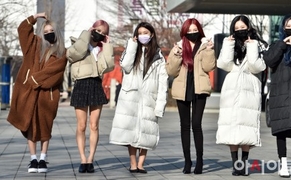 Cho Hyun (right), Korean Ambassador to India, welcoming PM Narendra Modi who visited Korean Pavilion, ahead of the opening ceremony of Maritime Summit held in Mumbai Convention Center in Maharashtra, India, on April 14./ Photographed by Ha Man-joo Cho Hyun (right), Korean Ambassador to India, welcoming PM Narendra Modi who visited Korean Pavilion, ahead of the opening ceremony of Maritime Summit held in Mumbai Convention Center in Maharashtra, India, on April 14./ Photographed by Ha Man-joo |
By Ha Man-joo, India correspondent, AsiaToday - Since Modi's taking office as Indian Prime Minister in May 2014, his administration has focused on promoting various economic initiatives, such as "Make in India", "Digital India", and "Skill India" by allegedly taking Korea as the main development model. Perhaps it's not an exaggeration to say the efforts of the Modi government as a part of "Look Korea."
The general view on "Look Korea" by diplomatic figures in New Delhi, that I've met over the past year, was generally positive. According to a diplomatic source, Korea is one of the four countries that are mentioned the most during Cabinet meetings under the chairmanship of PM Modi, along with the United States, China, and Japan.
India has chosen Korea as the exclusive partner country for the first Maritime India Summit held in Mumbai on April 14-16. On June 18, the government set up a special management team - "Korea Plus" - under 'Invest India' promoted by the Department of Industrial Policy & Promotion (DIPP) to facilitate and fast track investment proposals from Korea. These are good examples showing that the Indian government's "Look Korea" is actually a practical movement, not just Korea's selfish view.
What are the reasons for this? Korean Ambassador to India Cho Hyun talked about the overall possibilities of India in this context.
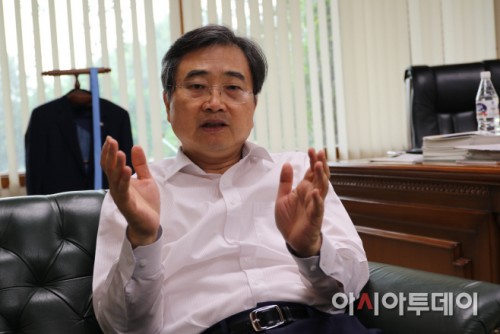 Cho Hyun, Korean Ambassador to India, having an interview with AsiaToday in his office in New Delhi on Thursday. He said, "This will be Korean companies' new renaissance to enter India."/ Photographed by Ha Man-joo Cho Hyun, Korean Ambassador to India, having an interview with AsiaToday in his office in New Delhi on Thursday. He said, "This will be Korean companies' new renaissance to enter India."/ Photographed by Ha Man-joo |
In an interview with AsiaToday at his Korea Embassy office in New Delhi on Monday, ambassador Cho Hyun said, "South Korea had accomplished the most recent economic growth. Similar to India, Korea did not rely on its colony but its excellent human resources in order to overcome poverty. Thus India is asking Korea to share its experience and investment as it promotes economic growth initiatives. Besides, the cities in the West or in Japan are good results of urbanization. However, Korea has underwent many trials and errors in the process of sharp industrialization and urbanization and made a good business model such as reorganization of city, new town and smart city construction. Its experience is being the subject of a good benchmark for India."
He said, "Korean companies such as Hyundai Motor, Samsung Electronics, and LG Electronics entered India 20 years ago when companies from the United States, Europe and Japan withdrew from. Their successful company activities in India is the third reason why India has chosen Korea as the partner country."
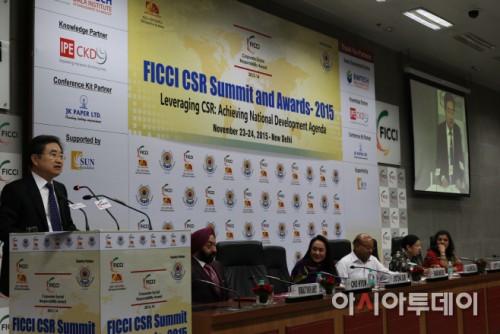 Cho Hyun (left), Korean Ambassador to India, delivering a speech at the FICCI CSR Summit and Awards held at Federation of Indian Chambers of Commerce & Industry (FICCI), New Delhi, on November 24, 2015./ Photographed by Ha Man-joo Cho Hyun (left), Korean Ambassador to India, delivering a speech at the FICCI CSR Summit and Awards held at Federation of Indian Chambers of Commerce & Industry (FICCI), New Delhi, on November 24, 2015./ Photographed by Ha Man-joo |
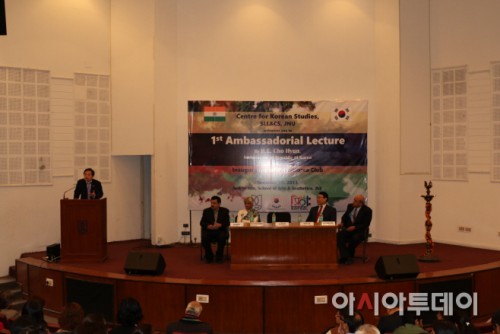 Cho Hyun (left), Korean Ambassador to India, delivering a talk to the school personnel and students at Jawaharlal Nehru University (JNU) Convention Center on November 19, 2015./ Photographed by Ha Man-joo Cho Hyun (left), Korean Ambassador to India, delivering a talk to the school personnel and students at Jawaharlal Nehru University (JNU) Convention Center on November 19, 2015./ Photographed by Ha Man-joo |
He said, "I'm trying my best to promote this to the Indian government, opinion leaders, citizens, and college students."
In fact, he has been delivering talks in various organizations and universities in India two to three times a month since he arrived to India last October. Last month, he delivered a lecture in Gauhati University in Guwahati, which took him 2-3 hours of flying and 5 hours of riding a car.
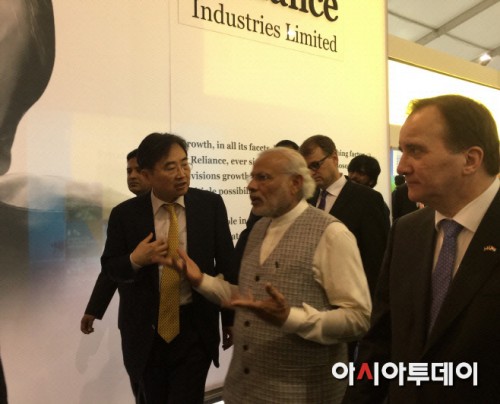 Cho Hyun (left), Korean Ambassador to India, introducing Korean Pavilion and Korean firms to PM Narendra Modi (center), who visited Korean Pavilion at Mumbai's Bandra Kurla Complex during the 'Make in India' weekly expo on February 13./ Photographed by Ha Man-joo Cho Hyun (left), Korean Ambassador to India, introducing Korean Pavilion and Korean firms to PM Narendra Modi (center), who visited Korean Pavilion at Mumbai's Bandra Kurla Complex during the 'Make in India' weekly expo on February 13./ Photographed by Ha Man-joo |
He has diligently met Indian leaders and opinion leaders to discuss how to deepen Korea-India relations in various fields including politics, economy and culture. The figures he met include PM Narendra Modi; Arun Jaitley, Minister of Finance; Nitin Gadkari, Minister for Road Transport and Highways; Suresh Prabhu, Minister for Railways; Manohar Parrikar, Minister of Defense, as well as local government ministers, university presidents, and research institute heads.
As a resident ambassador, he is interested in the Indian government's decision-making system. He said that Modi's government's decision-making system works very well and that even high government officials move in strict order.
Cho said, "Indian businessmen that I've met so far, such as TVS Motor Company CMD Venu Srinivasan, who was earlier the Honorary Consul General of Republic of Korea, and Mahindra & Mahindra President Pawan Kumar Goenka, is concerned about what India can do to overcome poverty by asking questions about driving force of Korea's social development."
He meant that the driving force behind the development of the Indian society comes by sharing understanding among PM Narendra Modi, government ministers, senior officials, businessmen, and the general public.
He said, "Just like Korea had a China boom 20 years ago, now is the moment where the fog created by incorrect information about India is lifting and a new entry boom is developing in India. As Korean companies such as Hyundai Motor, Samsung Electronics, and LG Electronics that entered India 20 years ago are now top companies in India, the requirements for new Korean company renaissance are ready."
The reasons were that India is growing rapidly, and various discussions are under way between the two countries in the government and private levels while Korea needs new investment market apart from China.
He said, "This renaissance should open a new way out for small businesses looking to enter Indian market as well as bringing additional investments by large companies. Picking good partners from India through Korea Embassy or Korea Trade-Investment Promotion Agency (KOTRA) will be the first step to a successful investment."
He said the driving forces behind India's economic growth are India's domestic-driven economy not highly affected by the world economic situation, domestic consumption led by young generation, and the fact that India is now on its path to become an economically developed country with current per capital GDP of around $1,600. He also said Modi government's reform, anti-corruption policies, and drastic social overhead capital (infrastructure) investment are other driving forces behind the economic growth.
Yet, India's biggest potential energy beyond all this is Indian citizens' intense desire for a better life and higher education reminiscent of Korea in the 70s.
Cho said, "Since its independence in 1947, India has grown into the world's largest democratic country without a single coup d'etat. Therefore its society cannot change suddenly depending on the government, and its economic growth policies remain, increasing transparency and predictability of the India's future. The interesting points to note will be education policies that solve rural problems, infrastructure, and illiteracy rate of 30%.
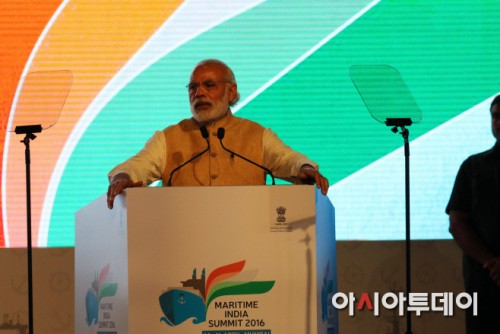 PM Narendra Modi delivering a speech at the opening ceremony of Maritime Summit held in Mumbai Convention Center in Maharashtra, India, on April 14./ Photographed by Ha Man-joo PM Narendra Modi delivering a speech at the opening ceremony of Maritime Summit held in Mumbai Convention Center in Maharashtra, India, on April 14./ Photographed by Ha Man-joo |
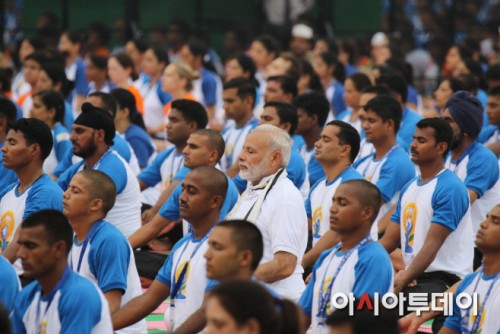 PM Narendra Modi participating in the mass Yoga Day demonstration in Chandigarh on June 21./ Photographed by Ha Man-joo PM Narendra Modi participating in the mass Yoga Day demonstration in Chandigarh on June 21./ Photographed by Ha Man-joo |
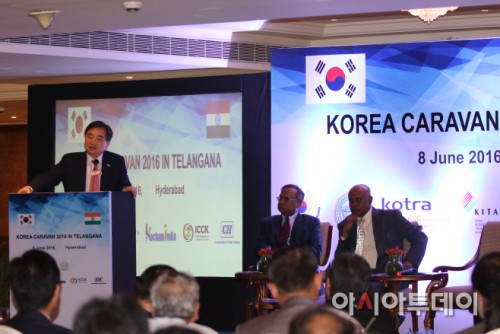 Cho Hyun (left), Korean Ambassador to India, delivering a welcoming speech at the 'Korea Caravan Forum' hosted by South Korea Embassy on June 8 in Hyderabad, Telangana, India./ Photographed by Ha Man-joo Cho Hyun (left), Korean Ambassador to India, delivering a welcoming speech at the 'Korea Caravan Forum' hosted by South Korea Embassy on June 8 in Hyderabad, Telangana, India./ Photographed by Ha Man-joo |
Most Read
-
1
-
2
-
3
-
4
-
5
-
6
-
7




















